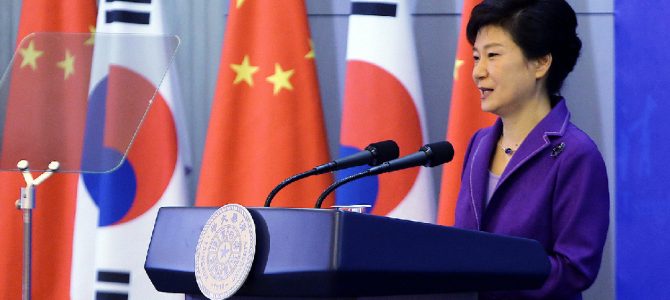
Whenever North Korea tests a missile, shoots at civilians on fishing boats, or threatens nuclear war, American friends often ask whether my fellow Koreans are panicked. I tell them what we say: “If you see a bomb falling run toward it, not away. It’s better to get it over with quickly!”
I learned as soon as I was old enough to read that guns and missiles are aimed at my head at all times. If we panicked every time North Korea acted out, we would have little time to do anything else, so instead we make jokes. Black humor is how we cope with constant existential threat, and my Israeli friends tell me they do the same.
This time, South Korea is beset by an internal existential crisis. The Constitutional Court just voted to oust the conservative, pro-America president Park Geun-hye, disgraced by a devastating corruption scandal. I moved back to Seoul months before the scandal erupted, and found the media’s non-stop, ravenous coverage of it exhausting and confusing. People around me had little idea of a war raging in Syria or of a refugee crisis, because cable news was busy breathlessly unearthing one piece of evidence after another, analyzing the designated villains’ every move and change of outfit, day after day. Perhaps this is how Americans felt during the O.J. Simpson trial.
Upon learning that our president had been puppeteered by shadowy cronies, the whole country was at first justifiably outraged and aggrieved. However, the spectacle fast morphed into a kind of morbid enthrallment. People sat in front of the TV in a trance and turned up in massive numbers to protests, which effectively became a form of weekend entertainment. When I declined to join a friend at the protest because I had to work, she said (without irony) “Come on, it’s really fun and there are a lot of good eats!” More than one acquaintance told me, “I can’t look away. It’s better than a soap opera.”
Park Was a Key Ally Against North Korean Aggression
This scandal is unlike any other that South Korea has seen in its history and with potentially serious consequences for U.S. relations. The impeachment ruling was achieved by unanimous vote and with bipartisan support. I saw staunchly conservative, anti-communist friends who hail from the heart of the nation that elected Park slowly turn their backs on her. Park came into office riding a heady wave of nostalgia for her father, Park Chung-hee, who ruled South Korea for 18 years until his assassination. Park the elder is, depending on whom you ask, either hailed as the architect of South Korea’s economic miracle or reviled as a ruthless and narcissistic dictator (and rarely both).
Ever since I covered her election in 2013, I had never been a big apologist for Park the younger. It was never clear to me whether she had the agility of mind and force of personality to fix an ailing economy and resist redistributive populism. Whatever her flaws, conservatives trusted that she would serve as a firm bulwark against North Korean threat in alliance with the United States.
The story buried beneath the impeachment story is that Park is no longer in a position to do that, and Americans should pay attention. For months, the former opposition forerunner Moon Jae-in has been somewhat unsurprisingly smacking his lips at the thought that the presidency now all but belongs to him. Moon is heir to the progressive lineage that wrought the “Sunshine Policy” upon the Korean peninsula. This policy of appeasement funneled condition-free aid and goodwill into the North Korean regime, under the ludicrous conceit that the North’s humanitarian crisis was somehow due to a lack of South Korean compassion.
Moon Jae-in has already vowed to “shift” U.S. relations, and called for “embracing” North Korea. Despite this establishment candidate’s fevered talk about “ushering in a new era,” current instability means he could easily be toppled by an ambitious third-party candidate. If 2016 taught us anything, it is not to bet too much money on the obvious choice.
What the U.S. Should Do Now
Going forward, it will be of critical interest for the South Korean leader to work with President Trump to protect Seoul against Pyongyang’s nuclear threat and Beijing’s bullying. Holding hands with Russia, China is warning of an arms race and boycotting South Korean businesses to protest THAAD, an advanced anti-missile defense system that the United States is deploying in South Korea in response to the North’s ballistic missile and nuclear tests.
Undoing the Park administration’s work with the Pentagon will jeopardize national security, and Moon has already shown ambivalence about upholding the current plan. Unless a compelling conservative candidate emerges and proves him- or herself to be free of the party’s baggage, the work of two consecutive pro-American administrations will be undone at a particularly perilous time.
Strong ties to the United States, liberal democracy, and a market economy have been and continue to be South Korea’s best bets for ensuring long-term security and prosperity. Despite recent events, I am not yet despairing for Seoul. Its young democracy continues to experience plenty of growing pains, but the South Korean people are resilient and resourceful. I hope our conservative leaders work to earn the public’s trust again and mount a forceful campaign against opportunists who are looking to use this crisis to revert to failed North Korea policies.









